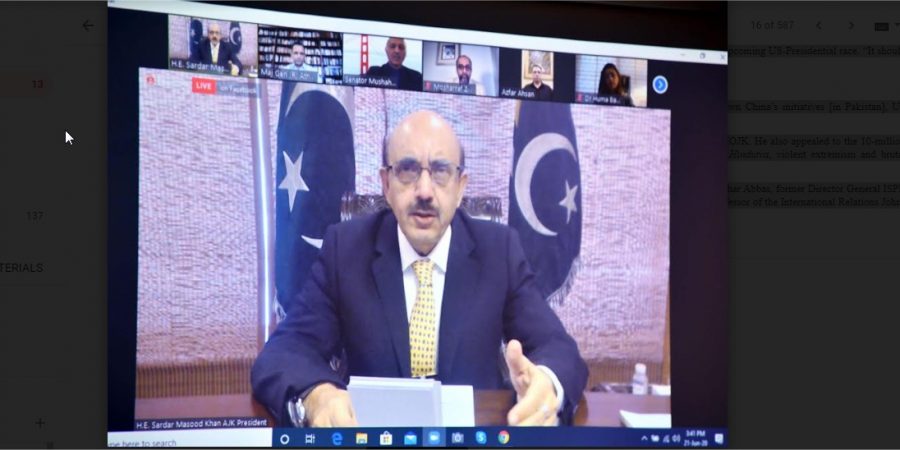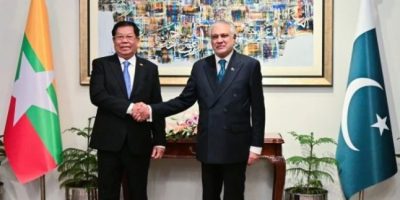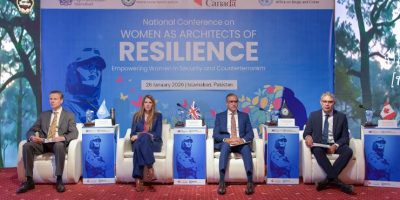Ladakh opens a new vista for Kashmir, new window for diplomacy: Masood Khan

Muzaffarabad; June 22: /DNA / = Sardar Masood Khan, President Azad Jammu and Kashmir, has said that though the China-India standoff has led to active clashes but there is no risk of a wider war, for the time being, because of India’s cautious and muted response due to its forces’ decisive routing at the hands of the People Liberation Army (PLA).
President Masood Khan made these remarks at a virtual conference on “China & India Standoff – what next: Implications for Pakistan, Kashmir Movement & Movement” organised by the Corporate Pakistan Group.
President Masood, who has served in China as a diplomat for eight years, has said that India has underestimated the steely resolve, nationalism and professionalism of the PLA.
The two US-based think tanks – the Belfer Centre at the Harvard Kennedy School of Government and the Center for a New American Security (CNAS) in their recent studies – have opined that India in a future confrontation would have an upper hand over China.
Radically disagreeing with this assessment, Masood Khan said that China and India’s capabilities might match in certain areas but in many dimensions, China outstrips India and can easily outcompete it.
China has, he said, an estimated 320 nuclear warheads compared to India’s 150. The number of PLA forces is 1.6 million compared to India’s 1.2 million (this is without counting the reserves). Last year, according to Stockholm International Peace Research Institute (SIPRI), China’s defence expenditure was $261 billion while India’s $71 billion, making them the second and the third largest defense spenders after the US. “The contrast is stark”, he said.
“But machines do not fight wars, nations do”, President Khan said adding that other factors like command and control, soldier morale, discipline, the justness of the cause, internal situations and the state of the economy play a pivotal part in determining the outcome of wars.
He said that India would not fight even a limited war because it doesn’t want a repeat of the 1962 war for which the violent extremist BJP-RSS regime excoriates Nehru till this day. “Modi does not want to go down as a new Nehru in history”, he said.
Besides, India’s economy has plummeted drastically and is incapable of sustaining any prolonged conflict. Despite their bluster, President Masood Khan said Indian armed forces have no history of fighting equals and winning. Their hallmark is they killing and maiming their own people or of occupied territories after disarming them.
“They have deployed 900,000 troops in Indian Occupied Jammu and Kashmir to fight, according to their own claims, 230 militants. That’s their power; that’s their strength”, he said.
President Masood said that India is clutching at two (proverbial) straws: the United States would bail it out of the present mess; and, second, that it would use economic and commercial disincentives and sanctions against China.
The AJK President said the total volume of China-India trade is $90 billion, with India exports goods and services worth only $16 billion and with a deficit of $54 billion.
India’s hype about economic sanctions against China, he said, is nothing but an exercise in self-flagellation and self-mutilation. “Above all, India does not have any moral high ground because it has waged wars against all its neighbours and has made the entire region turbulent”, he said.
Turning to India’s motives to stoke volatility along the Line of Actual Control (LAC) in Ladakh by building roads, bridges and permanent settlements in Galwan Valley and at Pangong Lake, President Khan said that the BJP-RSS regime wants to scupper the Belt and Road Initiatives (BRI) and the China-Pakistan Economic Corridor (CPEC), as well as to promote its agenda of lebensraum, irredentism and expansionism to realize its monomaniacal dream of Akhand Baharat. Its strategic planners, he said, are also trying to do the US bidding to become a counterweight to China. But, China sees these moves as attempts to encircle and isolate China’s phenomenal rise.
President Masood Khan said that it is neither prudent nor advisable to fish in troubled waters. Pakistan and Kashmiris, for one, do not want war and instability in the region. But in the emerging scenario, it is imperative for Pakistan to align its position with China even more closely in the strategic, military, political and diplomatic realms. Pakistan, he said, should side with China to salvage the BRI and CPEC among others.
The AJK President said that following recent developments in Ladakh, Kashmir has been further internationalised and debunked India’s myth that Kashmir is a domestic/internal problem. In the recent talks between Chinese and Indian officials to defuse the border spat, China specifically objected to the designation of Ladakh and J&K as Union Territories and the direct control of these disputed territories by Delhi.
President Masood Khan said that in the aftermath of the BJP-RSS regime’s illegal actions of August 5 and October 31 last year, China has opened two pathways – diplomatic and military – which are beneficial to Pakistan.
The first pathway was diplomatic when it, as a permanent member of the UNSC, facilitated three meetings of the Security Council on Kashmir. Secondly, by repulsing Indian advances in Ladakh, it has opened up a military dimension which should act as a deterrent vis-à-vis Indian aggression against China and Pakistan as well as the people of Jammu and Kashmir.
Sardar Masood Khan appealed to the United States to not just stand by and watch passively South Asia go down the path of war and confrontation but instead demonstrate leadership in a non-partisan manner, notwithstanding the huge internal distractions it is facing in regard to Covid-19, protests against racism and the upcoming US-Presidential race. “It should play the role of a good faith peacemaker. Siding with India emboldens it to commit aggression”, he said.
The President also appealed to Washington to help Pakistan and China put Kashmir back on the UNSC’s “horseshoe”.
In regard to Pak-China relations, the President quoted an excerpt from American writer Denial Markey: “Rather than publicly talk down China’s initiatives [in Pakistan], US diplomats should talk up US ones”.
Masood Khan appealed to the international civil society to start a sanctions campaign against India to highlight and stop genocide in the IOJK. He also appealed to the 10-million strong diaspora community to open new avenues for Kashmir diplomacy and communicate with Indian civil society which opposes Hindutva, violent extremism and brutal occupation of Jammu and Kashmir by the BJP regime.
The Conference was also attended by Senator Mushahid Hussain Sayyed, Chairman Senate Foreign Relations Committee, Maj Gen (rtd) Athar Abbas, former Director General ISPR and Dr. Huma Baqai, Associate Dean & Professor Institute of Business Administration. From abroad, Daniel Markey, Senior Research Professor of the International Relations Johns Hopkins University, Professor Adil Najam, Dean Boston University, and Sajjad Karim, former Member European Parliament joined in.
Related News

Pakistan, Myanmar vow stronger ties via sustained diplomatic engagement
ISLAMABAD, JAN 26: Pakistan and Myanmar on Monday moved to reinvigorate their bilateral relationship, reaffirmingRead More

UK leads push for women’s central role in Pakistan security
ISLAMABAD, JAN 26 /DNA/ – The British High Commission in Pakistan today reaffirmed its leadershipRead More


Comments are Closed